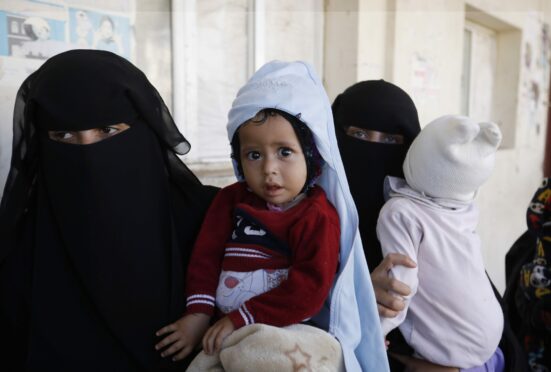
Wars have, for centuries, been waged with bombs, bullets and bloodshed but, as Catriona Murdoch knows only too well, the worst weapons can have no trigger.
After leading investigations into conflict-related famine around the world, the human rights lawyer, who has advised the United Nations Security Council and the Human Rights Commission, fears hunger has been deliberately weaponised around the world and reveals evidence suggesting man-made starvation is increasingly being used against civilians in Yemen, Syria, South Sudan, Somalia, Ethiopia, and Ukraine.
She said: “Our work really started in Yemen and this sort of crime is often ignored. Yemen as a conflict is very much the forgotten war.
“These long conflicts don’t tend to hit the headlines anymore. Some parts of that investigation are particularly harrowing.
“You have airstrikes on hospitals or agricultural areas and that would be connected with the blockage of food coming in through the borders and the strangling of a country and its civilian population.
“Syria also sticks in my mind. We looked into examples where people were under siege for a long time.
“They would be lured to a checkpoint with food being hung on a stick enticing starving people and then when they approached the checkpoint they would be shot.
“Those are the kind of cases that keep you up at night.”
Murdoch, originally from Glasgow and now commuting between the Borders and the Hague, is a senior legal consultant at Global Rights Compliance, an international legal partnership committed to enhancing compliance with international humanitarian law and human rights.
Her focus on conflict-related hunger is a growing area of concern. In 2021, it was estimated that 139 million people across 24 countries faced hunger because of war.
She worked with the Swiss Federal Department of Foreign Affairs between 2018 and 2019 on their proposal to amend the Rome Statute, the treaty that established the International Criminal Court, to include the war crime of starvation in a non-international armed conflict.
The amendment was unanimously adopted in December 2019. The UK is among those who have not ratified the amendment – failing to recognise deliberate starvation of civilians as a war crime.
Murdoch said it was a grave mistake to think starvation was a completely inevitable collateral consequence of warfare.
She said: “We try to work out how the conflict works, what the violations look like, how they might be prosecuted or investigated and support anyone from humanitarian agencies to civil and human rights groups.
“We do a lot of work raising awareness of the fact that conflict-induced hunger is very much a deliberate strategy that we are seeing increasingly around the world.
“We’ve worked on investigations in Yemen, South Sudan, Tigray and we have a new one in Ukraine.
“The motivation is to demonstrate to the international community that hunger is a hidden part of many of these recent conflicts and really warrants investigation.
“I am incredibly motivated to see what can be done to get recognition of what is happening to these people.
“It’s very similar to how it used to be with sexual and gender-based violence. There was a sort of ‘boys will be boys’ approach and it was seen as one of these things that just happened in conflict.
“That’s the same with starvation. People assume, ‘Of course, people will go hungry’ but they miss the fact that this can be very much a deliberate strategy.
“It is designed to very cheaply weaken and get rid of a certain sort of ethnicity or civilian population.
“The subject matter is incredibly harrowing. The indignity that goes with a lot of these crimes – which child do you feed, the inability to get your family to a hospital because you have no food.
“Starvation is not a new thing, people have been using it since medieval times but there is a playbook now from Tigray to Ukraine.
“There is a sense of impunity that people think can get away with it and they think they can just do what they want.”
Murdoch has worked on cases arising out of the Rwandan Genocide, the conflicts in Iraq, Yemen, Syria, South Sudan and the former Yugoslavia.
Now, Ukraine is a growing focus. She said: “Prior to February, my money would be on the first prosecution being in an African context.
“Now, there is a much greater chance that the first prosecutions on this may come out of the conflict in Ukraine.
“This is the first time we are seeing use of starvation as a method or warfare in an international armed conflict. Most of our work has been in civil wars.”
Murdoch was also previously appointed to the International Nuremberg Principles Academy, a foundation intended to promote international criminal law headquartered at the historic site of the Nuremberg Trials which prosecuted Nazi war criminals at the end of the war.
She added: “Parties to the International Criminal Court have an opportunity to act and call out the suffering of innocent victims of deliberate state-led conflict-induced hunger.
“There is no room for excuses and state parties must do their duty and hold perpetrators to account for the use of starvation in war so they cannot continue to act with impunity.
“Through our investigations, we are seeing this crime being waged in current and recent conflicts, we must condemn deliberate starvation and equip those with an investigative or prosecutorial mandate to act.
“Pressure is needed to catalyse governments to take a stand against the barbaric and tragic crime.
“It should not be acceptable for starvation to be viewed as an inevitable consequence of war.”

Enjoy the convenience of having The Sunday Post delivered as a digital ePaper straight to your smartphone, tablet or computer.
Subscribe for only £5.49 a month and enjoy all the benefits of the printed paper as a digital replica.
Subscribe © Arthur Koppejan
© Arthur Koppejan